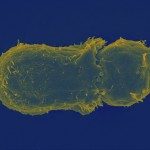Lien vers Pubmed [PMID] – 11100805
Crit. Rev. Immunol. 2000;20(4):325-46
The number of surface TCR-CD3 complexes is maintained by an equilibrium between the synthesis and secretion of new polypeptides, their internalization, recycling, and degradation. The different subunits of the TCR-CD3 complex do not display the same intracellular trafficking dynamics. Thus, in the absence of stimuli, TCR and zeta chains may be degraded at a higher rate than CD3 subunits, which are mostly recycled. T-cell activation by antigen, anti-TCR-CD3 antibodies, or pharmacological activators of protein kinase C, results in increased TCR-CD3 internalization, followed by the downmodulation of TCR-CD3 surface levels. Once internalized, TCR-CD3 complexes may either enter a recycling pathway or be sorted to lysosomes and degraded. Protein serine kinases and protein tyrosine kinases may influence the internalization and intracellular sorting of TCR-CD3 complexes. In line with these results TCR-CD3 ligands stimulate both TCR-CD3 internalization and degradation, whereas protein kinase C activators stimulate internalization only. Depending on the stimulus applied, internalization motifs from one or several TCR-CD3 subunits mediate endocytic routing of the complex. The involvement of signaling molecules in the intracellular fate of TCR-CD3, the nature and location of sequences for internalization and intracellular sorting, and the role of downregulation in T-cell activation are still the main open questions.

